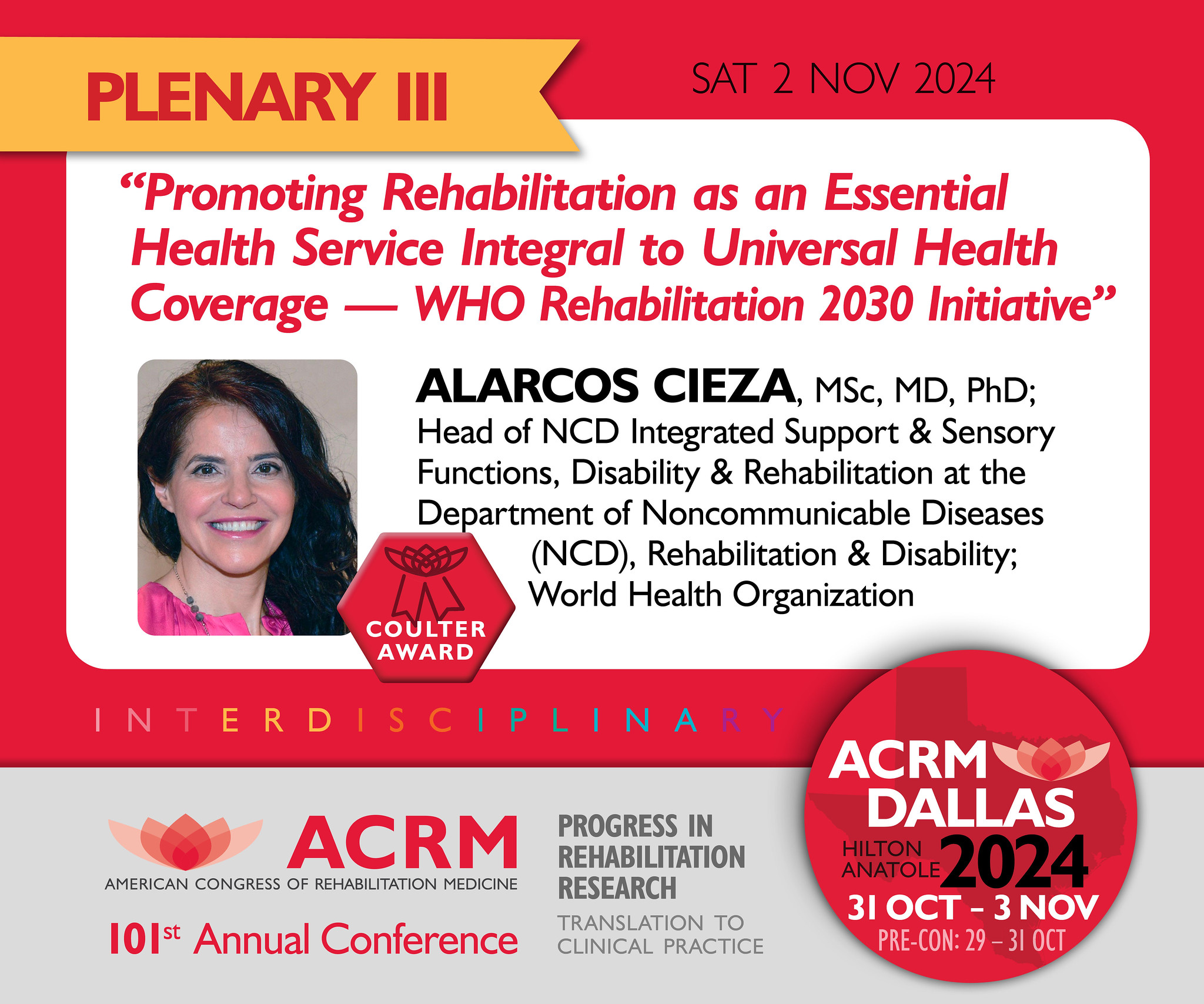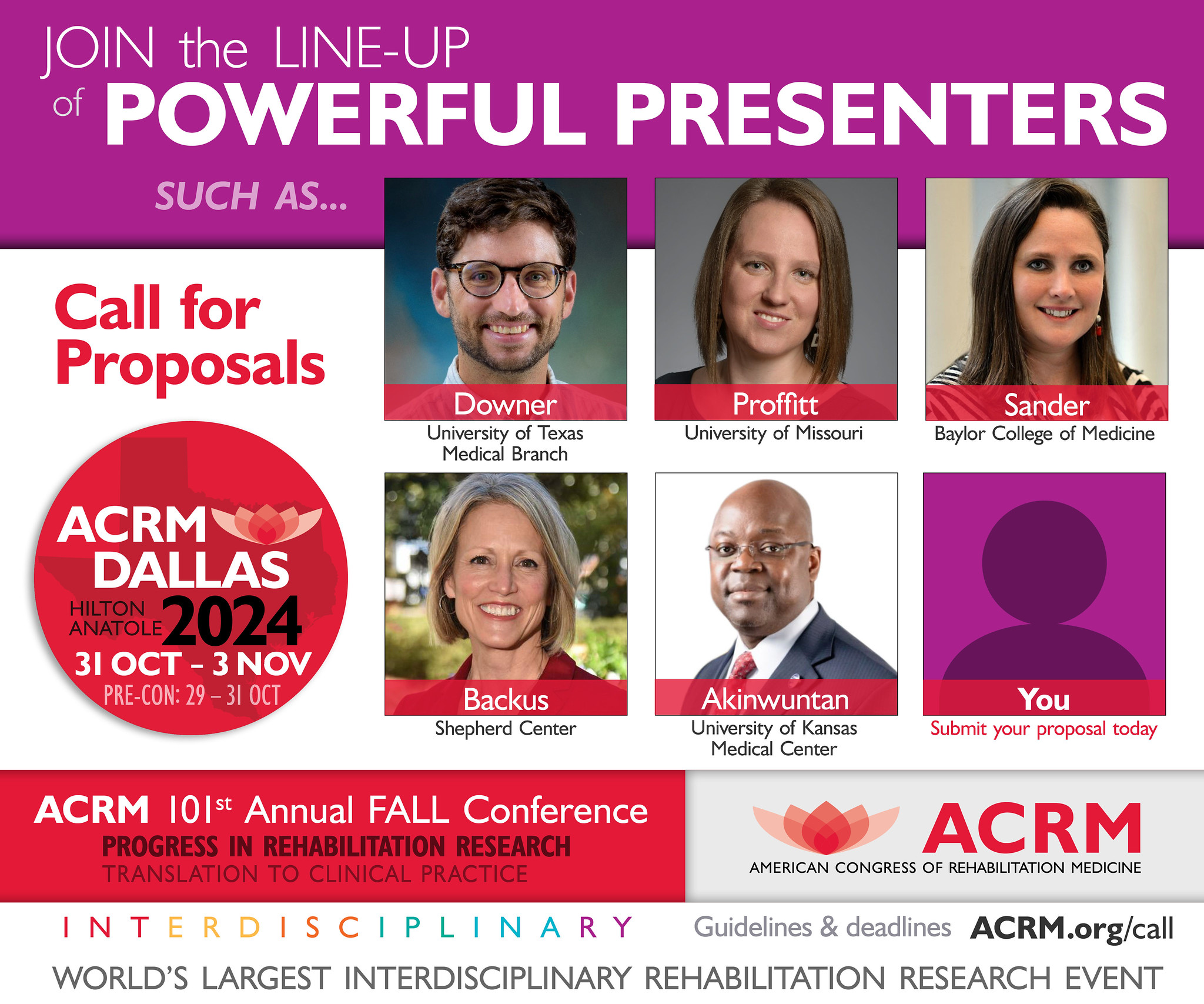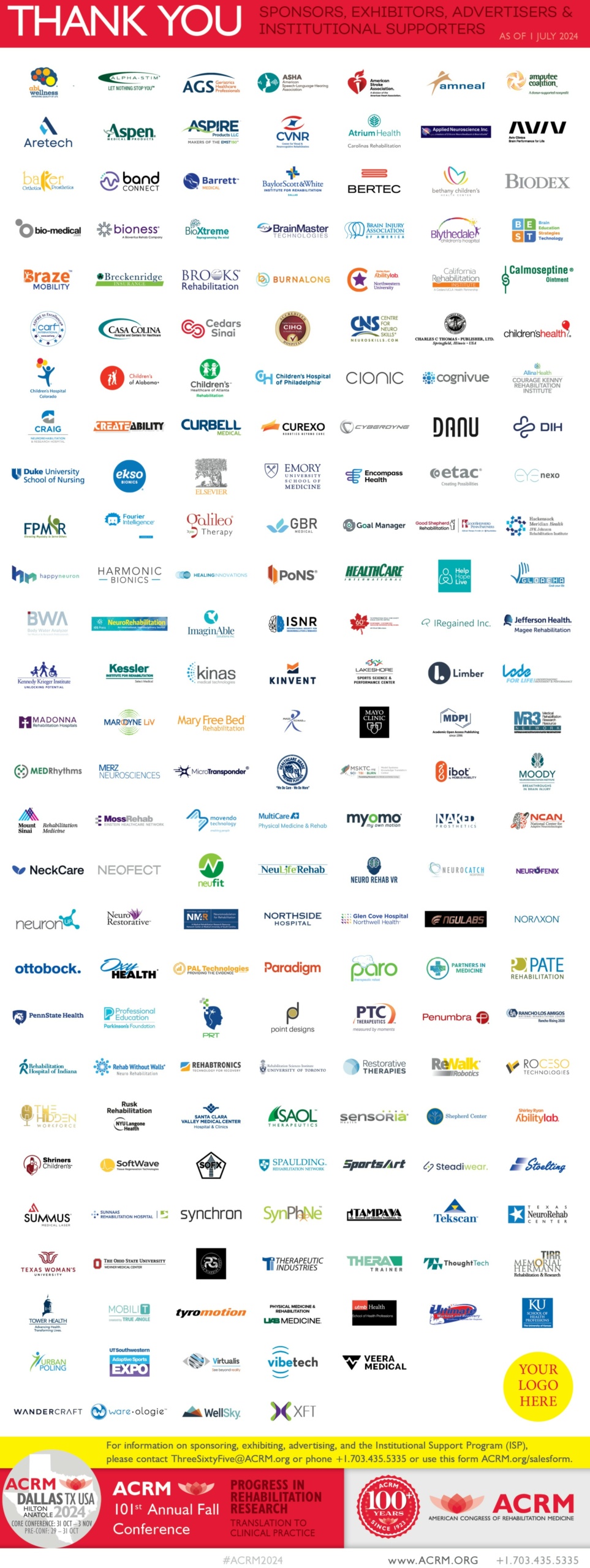Networking is an essential part of leveraging your conference attendance for maximum advantage. These special opportunities will help you get started.
LUNCH WITH A PURPOSE
Nourish your career over lunch with these great opportunities for peer-to-peer learning and networking.
Brucker International Luncheon with Speaker (ticketed event):
International Partnering in Research
Fri, 15 November, 12:00 PM — 1:30 PM
The ACRM International Networking Group sponsors this luncheon featuring Kathryn M. McPherson, RN, RM, Dip HV, BA (Hons), PhD, professor of rehabilitation and Laura Fergusson Chair for the School of Rehabilitation and Occupation Studies and the director of the Person Centred Rehabilitation Centre in the Health and Rehabilitation Research Centre (HRRC) at AUT University in Auckland, New Zealand.
Kath’s research has focused on person-centered rehabilitation – particularly in long term neurological conditions, pain related conditions, cancer survivorship and palliative care.
International partnering in research offers a wide ranging set of opportunities and challenges in applying for funding, doing the work, and translating findings. This presentation will examine these issues through the eyes of one researcher (and one research team), based in New Zealand. Despite successful international collaborative funding applications in Europe, Asia, UK, North America and Australasia, not all have been straightforward, and robust structures to manage the complexity are clearly vital. Establishing good relationships, truly respecting the knowledge, expertise and cultural perspectives of others doesn’t just happen. But when it does – it can be exciting and transformative.
Learning Objectives
To support the attainment of knowledge, competence, and performance, the learner should be able to achieve the following objectives:
- Understand the actions that work to maintain international collaborations.
- Re-think the place of knowledge exchange in working across cultures and countries.
- Reconsider the added value of working with researchers and clinicians in other countries.
SCI-ISIG Luncheon with Speaker (ticketed event):
The Role of Research in Reimbursement
Thu, 14 November, 12:00 PM — 1:30 PM
Image of Jennifer French, SCI-ISIG Luncheon speakerJennifer French, MBA, the executive director for Neurotech Network, will moderate a panel of experts to discuss The Role of Research in Reimbursement, followed by open audience discussion.
Out of pocket costs and third party reimbursement drive access to rehabilitation services, equipment and technology for persons with spinal cord injury. Financial impact is a key consideration in the decision process. How can the research community impact clinical practice, clinical services and financial access? This panel discussion will focus on novel ways to work with third party payers to gain financial access to essential services and equipment. It will also focus on how to use current research within the reimbursement process with consumer, clinical and industry perspectives. The session will also highlight examples of how this is accomplished. Open discussion with attendees will lead into how to foster relationships between clinicians and researchers to impact future outcomes to guide reimbursement decision-making toward the spinal cord injury population.
Learning Objectives
To support the attainment of knowledge, competence, and performance, the learner should be able to achieve the following objectives:
- Understand the impact the issues and perspectives of the consumer, clinician and industry in the reimbursement process and financial access.
- Provide examples of how research has impacted reimbursement for clinical services or equipment with successful outcomes.
- Discuss novel ways of using research to gain access to essential services and equipment.
- Foster key relationships of how future rehabilitation research can assist with the reimbursement decision process.
Panelists Include:
- Kim Anderson-Erisman, PhD, Research Associate Professor and Director of Education, Miami Project
- Scott Simcox, PhD Candidate, Chief Technology Officer, Restorative Therapies
- Mary Schmidt-Read, PT, DPT, MS, SCI Program Director and Coordinator of Research, Director of NeuroRecovery Network, Magee Rehabilitation
[hr]
THE BEST OF THE BEST: AWARD WINNER PRESENTATIONS
Deborah L. Wilkerson Early Career Award Lecture:
Alexithymia after Brain Injury: What it is and Why it Deserves More Attention
Thu, 14 November, 1:00 PM – 1:30 PM
Award Recipient:
Dawn Neumann, PhD
Indiana University
Rehabilitation Hospital of Indiana
Indianapolis, IN
The Deborah L. Wilkerson Early Career Award is given in memory of Deborah L. Wilkerson, former ACRM president and fellow. Deborah was devoted to improving the quality of rehabilitation and independent living services, and was a powerful advocate for individuals with disabilities. The 2013 Deborah L. Wilkerson Early Career Award honors Dr. Neumann for the significant contributions she made to rehabilitation research during her early career work.
Alexithymia after Brain Injury: What it is and Why it Deserves more Attention
How we process our emotions affects the way we behave and interact with others. When people have reduced awareness for their emotions and difficulty labeling, differentiating and understanding their own emotions, it is referred to as alexithymia. Alexithymia is quite common after brain injury, with some studies reporting rates between 30-61% of their sample population. This is a significant problem as studies have found alexithymia to be associated with self-regulation of emotions, recognition of others’ emotions, and the ability to experience and respond empathically to others. This symposium will present findings from a recent study demonstrating the relationship alexithymia has with aggressive behaviors, reduced perspective-taking tendencies, and negative interpretations of others’ behaviors. Our results suggest that treating alexithymia may be important for reducing negative socio-emotional behaviors. Future directions and clinical implications will be discussed.
Learning Objectives
To support the attainment of knowledge, competence, and performance, the learner should be able to achieve the following objectives:
- To learn what alexithymia is and its prevalence after TBI.
- To learn, through a discussion of theories and empirical findings from former research in TBI and non-TBI populations, possible implications of alexithymia and why it is so important.
- To learn about new relationships found between alexithymia and important socio-emotional deficits after TBI, and the relevance of these findings to TBI rehabilitation.
John Stanley Coulter Award Lecture:
Measuring, Managing, and Predicting Rehabilitation Outcomes: Reflections on Nearly 30 Years of ACRM Membership and a Research Agenda
Sat, 16 November: 10:30 AM – 11:30 AM
Award Recipient:
Allen Heinemann, PhD, ABPP (RP), FACRM, Feinberg School of Medicine, Northwestern University and Rehabilitation Institute of Chicago, Chicago, I
Since 1951, the John Stanley Coulter Award has been given in memory of the man many regard as “the father of physical medicine and rehabilitation.” The 2013 John Stanley Coulter Award honors Dr. Heinemann in recognition of the significant contributions he has made to the field of rehabilitation.
Measuring, Managing, and Predicting Rehabilitation Outcomes: Reflections on Nearly 30 Years of ACRM Membership and a Research Agenda
ACRM members have demonstrated a keen interest in measuring and monitoring rehabilitation outcomes since the organization’s inception, and their research products have influenced healthcare practice and policy. By way of example, ACRM was a co-applicant for the grant award from the National Institute on Disability and Rehabilitation Research (NIDRR) that developed the Functional Independence Measure (FIM). Subsequently, the Centers for Medicare and Medicaid Services adopted the FIM as the basis of its Prospective Payment System for Inpatient Rehabilitation Facilities. NIDRR’s Long Range Plan for 2013-2017 emphasizes research that determines “the features of possible interventions that are most significant in achieving desired outcomes and the measures that would be required to illustrate those outcomes.” This priority is consonant with Gale Whiteneck’s 1994 Coulter lecture, titled “Measuring What Matters: Key Rehabilitation Outcomes.”
In the intervening 20 years, we have benefitted from the development of detailed taxonomies of health and disability; models of healthcare structure, process, and outcome; and efforts to define healthcare quality measures. Needed now are sustained efforts to evaluate promising interventions with carefully targeted endpoints operationalized by instruments that are reflective of and sensitive to clinical investigators’ goals.
This lecture will review the history of rehabilitation outcome measurement, identify sentinel events in the development of rehabilitation outcome measures, and describe opportunities to improve rehabilitation services through the routine collection, reporting and aggregating of details about rehabilitation services, processes, and outcomes. In so doing, I illustrate ways in which ACRM can pursue its mission to “improve lives through interdisciplinary rehabilitation research.”
Learning Objectives
To support the attainment of knowledge, competence, and performance, the learner should be able to achieve the following objectives:
- Describe the history of rehabilitation outcome measurement
- Identify sentinel events in the development of rehabilitation outcome measures
- Describe opportunities to improve rehabilitation services through the routine collection, reporting and aggregating of details about rehabilitation services, processes and outcomes
- 2013 award winner is Allen Heinemann, PhD, ABPP (RP), FACRM.
[hr]
RECEPTIONS:
Exhibitors Welcome Reception
with Poster Viewing & Outstanding Poster Awards Presentation
Thu, 14 November, 5:00 PM – 7:00 PM (with poster authors)
Bring the Expo Game Card found in your attendee bag and visit the EXPANDED Annual Conference Expo. More than twice as many exhibitors as last year to introduce you to the latest technologies, pharmacology, robotics and more! Visit them all to win EXCITING prizes!
The welcome reception and poster viewing will be held inside the Expo. Meet colleagues for refreshments and engage with poster authors. Outstanding Poster Awards will be presented.
Henry B. Betts Awards Gala (ticketed event)
Fri, 15 November, 7:00 PM – 11:00 PM
Join colleagues for an evening of celebration! Explore international buffets and chefs’ stations for a culinary sampling from across the globe, paired with wines from more than a dozen countries. Then, raise a toast to the 2013 ACRM Fellows and winners of seven prestigious ACRM awards for excellence, including:
Gold Key Award:
Ralph M. Nitkin, PhD
Distinguished Member Award: Claire Kalpakjian, PhD
John Stanley Coulter Award: Allen Heinemann, PhD
Deborah L. Wilkerson Early Career Award: Dawn Neumann, PhD
Mitchell Rosenthal Mid-Career Award: Joshua Cantor, PhD, ABPP
Elizabeth and Sidney Licht Award: Lisa Ottomanelli, PhD
Edward Lowman Award: Elliot Roth, MD
2013 Fellows:
Leighton Chan, MD, MPH, FACRM
Flora Hammond, MD, FACRM
Cindy Harrison-Felix, PhD, FACRM
Mike Jones, PhD, FACRM
Virginia “Ginna” Mills, MS, PT, CCM, LicNHA, FACRM
Ronald T. Seel, PhD, FACRM
Lance Trexler, PhD, FACRM
After Gala Party (ticketed event)
Fri, 15 November, 8:30 PM – 11:00 PM
Skip the dinner if you must, but don’t miss the celebration! The evening continues after the awards with music and dancing at the After Gala Party.
[hr]
MEETINGS:
ACRM Membership Meeting
Fri, 15 November, 5:00 PM — 6:30 PM
Open to all attendees, the ACRM Membership Meeting is a great place to learn about the current activities of ACRM and upcoming opportunities. Witness the passing of the presidential necklace from current president, Tamara Bushnik, PhD, FACRM (2011 – 2013) to president-elect, Sue Ann Sisto, PT, PhD, FACRM (2013 – 2015) and hear her first membership address.
ISIG, Networking Group, Committee & Task Force Meetings
Many of the ACRM Interdisciplinary Special Interest Groups (ISIG), Networking Groups, and task forces will meet during the annual conference. All attendees are welcome and encouraged to attend any of the following meetings to learn about the group’s purpose and ways to get involved.
Thursday, 14 November:
7:00 AM – 8:00 AM: BI-ISIG Girls and Women with TBI Task Force
7:00 AM – 8:00 AM: Early Career Networking Group Physicians Task Force
7:00 AM – 8:00 AM: SCI-ISIG Business Meeting
7:00 AM – 8:00 AM: Military & Veterans Affairs Networking Group
7:00 AM – 8:00 AM: Membership Committee (by invitiation only)
7:00 AM – 8:00 AM: Stroke-ISIG Executive Committee (by invitiation only)
7:00 AM – 8:00 AM: Stroke-ISIG Movement Intervention Task Force
10:30 AM – 11:30 AM: Chair Council (by invitation only)
10:30 AM – 12:00 PM: Neurodegenerative Diseases Networking Group
12:30 PM – 1:30 PM: BI-ISIG Annual Summit
Friday, 15 November:
7:00 AM – 8:00 AM: Health Policy Networking Group
7:15 AM – 8:15 AM: BI-ISIG Disorders of Consciousness Task Force: Minimal Competency Guidelines for Acute Rehabilitation
8:30 AM – 10:00 AM: International Networking Group
12:00 PM – 1:00 PM: Communications Committee
12:00 PM – 1:00 PM: Policy and Legislation Committee (by invitation only)
12:00 PM – 1:00 PM: BI-ISIG Long-Term Issues Task Force
12:00 PM – 1:15 PM: BI-ISIG Community-Based Rehabiliation Task Force
12:00 PM – 1:15 PM: BI-ISIG Cognitive Rehabilitation Task Force
12:00 PM – 1:15 PM: Stroke-ISIG Vision Task Force Lunch Off-Site
12:00 PM – 1:30 PM: BI-ISIG Mild TBI Task Force
12:15 PM – 1:30 PM: Stroke-ISIG Task Force Chairs (by invitation only)
1:30 PM – 3:00 PM: Stroke-ISIG Business Meeting
3:30 PM – 5:00 PM: Outcomes Measurement Networking Group
5:00 PM – 6:30 PM: ACRM Membership Meeting
Saturday, 16 November:
7:30 AM – 8:30 AM: BI-ISIG Prognosis after TBI Task Force
7:30 AM – 8:30 AM: BI-ISIG Disorders of Consciousness: Acute Confusion Case Definition Project
7:30 AM – 8:30 AM: BI-ISIG Pediatric and Adolescent Task Force
7:30 AM – 8:30 AM: Stroke ISIG Living Life after Young Stroke Task Force
7:30 AM – 8:30 AM: Geriatric Rehabilitation Group
7:30 AM – 8:30 AM: Program Committee (by invitation only)
11:30 AM – 1:00 PM: Early Career Networking Group Business Meeting
Board Meetings (by invitation only)
Tuesday, 12 November:
10:00 AM – 5:00 PM: ACRM Board of Governors
Saturday, 16 November:
11:30 AM – 2:00 PM: Archives Editorial Board
3:30 PM – 6:00 PM: ACRM Board of Governors









